Texas Commission on Community College Finance
Report to the 88th Legislature





Texas is thriving economically. We have the ninth largest economy in the world, and our employers are poised to create millions of new jobs in the coming decade, thanks to our favorable business climate.
But our workforce needs are changing, in our communities, across the state, and around the nation and world. More and more jobs require employees to have specific skills they can only get by earning certificates, degrees, and other credentials beyond their high school diplomas.
The competitiveness of our state increasingly depends not only on the number of jobs but also the quality of jobs we create and attract. Texas community colleges play key roles in helping Texans earn the credentials required for good, self-sufficient jobs.
Along with the other members of the Texas Commission on Community College Finance (TxCCCF), I have spent the past year looking at this changing economic landscape and how our 50 community college districts can support the state’s workforce.

The Commission quickly recognized two big challenges to meeting these workforce needs and maintaining our economic momentum.
First, outside our state borders, Texas is competing with other states and nations that are facing the same pressures. Those areas are actively investing in workforce education to increase their share of new jobs and economic growth.
Second, inside our borders, the demand for jobs that require postsecondary credentials is highly concentrated in about 10 of our 254 counties — while the potential workforce to fill these jobs is spread across the state, in urban, rural, and suburban areas.
To solve these challenges, being incremental is not enough. We need to be bold.
We need a funding model for our 50 community college districts that is strategic, deliberately aligned with our emerging workforce needs, and that fosters a strong partnership between local community colleges and the state. This new funding model must empower colleges across the state to support local employers who rely on a talented workforce.
It must also ensure more Texas students enroll in and complete degrees, certificates, and other credentials that translate into value and opportunity in the state’s economy.
Our Commission believes the new funding model must do three things: reward colleges for positive outcomes, especially in credential completion and transfer, ensure equitable access through financial aid, and help community colleges increase capacity to meet rapidly changing workforce needs.

Chairing this Commission and developing these recommendations has been a highlight of my many years of public service. I am honored Governor Greg Abbott asked me to take on this challenging yet important role to help prepare Texas for an even stronger future.
Working with my fellow members — lawmakers, community college leaders, and policy experts — I drew from my decades of experience in business and higher education to better understand Texas community colleges’ opportunities to develop an increasingly talented workforce.
Our goal is for every state dollar for community colleges to be tied to the goals outlined in Building a Talent Strong Texas, the state’s new strategic plan for higher education, and to translate into greater opportunities for individual Texans and more high-performing employees for the workforce. The recommendations in this report are designed to directly support our students, families, colleges, and employers.
As you’ll read throughout this report, Texas’ highest priority must be to develop a competitive workforce for the future. If we can achieve that, it will help us solve the other challenges we will face in the mid-21st Century and secure our quality of life into the future for our children and grandchildren.
Woody Hunt Senior Chairman Hunt Companies, Inc.Under the current Texas community college funding model, the majority of funding is generated by tuition and property taxes, which are set and collected locally. Colleges’ elected boards of trustees set tuition rates and adopt property tax rates for the maintenance and operations of colleges and for debt service. Over the past decade, local property tax collections have increased significantly.
This model reflects the origin of the state’s network of 50 community college districts. These colleges were created locally to provide higher education opportunities to area students before they entered the workforce or went to four-year universities.

The needs and goals of community colleges today are different than when this model was developed. Community colleges now play a vital role in awarding the credentials of value that many new jobs require in Texas’ economy. Now, state leaders have a historic opportunity to develop a new funding model that recognizes community colleges’ contributions to state and regional economies, especially through the associate degrees, certificates, and other credentials they award.
There is currently wide variation in the property tax rates community colleges adopt for maintenance and operations — from less than 2 cents to more than 39 cents per $100 of taxable value. There is also wide variation in community colleges’ taxable property values, resulting in dramatic differences in the funding colleges can generate on their own — ranging from about $11 per full-time equivalent student per penny of tax effort to more than $1,100 per full-time equivalent student per penny of tax effort.
In the current biennium, state formula funding for community colleges is about $1.8 billion, distributed through an allocation methodology that considers how colleges perform in relation to one another. The formula is primarily driven by “contact hours” tied to student enrollments and types of courses delivered. It also
includes “success points” — based on specific metrics colleges have met over the previous three years — and a uniform amount of “core” funding allocated to each college.
Texas has the opportunity to develop a new funding model that generates more consistent base levels of funding for instruction and operations across community colleges. In particular, the new model must ensure that small and rural-serving colleges with lower property values have the resources needed to serve students inside and outside their service areas and to meet local employers’ workforce requirements.
The new funding model should also incentivize and empower Texas’ 50 community college districts to train, support, and offer credentials of value to students from all backgrounds so they can meet employers’ needs today and tomorrow. Texas is one of the most diverse states, and helping colleges provide equitable opportunities across all student populations is essential to achieving the state’s higher education goals. This model should fully support Texas in its pursuit of excellence in the global competition for jobs and in becoming the premiere leader nationally in addressing the changing needs of the workforce. Finally, the new model must encourage partnerships and shared services among colleges to help more students afford college, complete credentials of value, and transfer to four-year institutions.
This can be done in multiple ways.
The new funding model should recognize and reward community colleges’ vital role in awarding associate degrees, certificates, and other credentials of value that will be required in more than 60 percent of all the jobs in Texas over the next decade. In particular, the new model should fully recognize non-credit workforce education programs that have become increasingly important to meet workforce demands and that are critical to mid-career employees’ upskilling and reskilling.
The new model should recognize the additional costs of serving economically and academically disadvantaged students or adult learners who depend on postsecondary credentials of value to increase their long-term earnings potential. These students often require targeted support inside and outside the classroom and more flexible schedules to accommodate their employment or family responsibilities.
The new model should also provide temporary funding to help colleges transition to a dynamic, primarily outcomes-based funding formula. It is also important to create a process through which funding may be adjusted between legislative sessions to reduce the impact of any unintended consequences that result from changes to the existing model.
In addition to dynamic formula funding for colleges, a comprehensive approach to meeting the state’s emerging workforce needs must provide financial aid that will help more low-income students participate in and complete postsecondary credentials. This strategic investment is particularly important as the state moves past the global COVID-19 pandemic, which caused many low-income students to delay or forego college enrollment.
This year, the state’s principal need-based aid program for students at community colleges, Texas Educational Opportunity Grants (TEOG), is projected to serve approximately 28 percent of eligible students. The state has the opportunity to bring those levels closer to the support provided by TEXAS Grants, which this year will provide assistance to more than 68 percent of qualified low-income undergraduate students attending fouryear institutions.
A funding model that increases need-based financial aid will help more eligible students complete community college programs that lead to postsecondary credentials of value without incurring high levels of debt. This investment will especially help students who live outside community colleges’ taxing districts and generally pay higher, out-of-district tuition rates.
Across the state, enrollments in dual credit courses accelerated rapidly over the past two decades as state policymakers aligned incentives to encourage school districts and colleges to offer more dual credit courses. However, enrollments in these courses, which can set high school students on early pathways to success, continue to lag for students who are economically disadvantaged. In addition, tuition charged to high school students for these courses varies greatly between different colleges and different programs at the same college. Through targeted investments in need-based aid for these students, the state can ensure equitable opportunities for economically disadvantaged high school students to enroll in dual credit courses.
Percent of Students Earning Dual Credit Each Year, by Socioeconomic Status 18% 16% 14% 12% 10% 8% 6% 4% 2% 0%
Economically Disadvantaged
2011 2012 2013 2014 2015 2016 2017 2018 2019 2020 2021 2022
Finally, state leaders have significant opportunities through the TEOG program to support students in short-term workforce training programs, including work-based learning partnerships with employers, such as apprenticeships and internships.
Today, community colleges represent more than 40 percent of higher education enrollment across Texas. However, over the past decade, the growth in community college enrollments has not kept pace with the state’s rapidly growing population and accelerating changes in regional and state workforce needs.
• Academic enrollments (excluding dual credit) declined by approximately 100,000 from their peak in Fall 2011 to Fall 2021.
• Enrollment in workforce education programs (excluding dual credit) declined by approximately 93,000 from Fall 2011 to Fall 2021.
• Only 17,000 community college students were enrolled in workforce-focused dual credit courses in Fall 2021, slightly more than 10 percent of all community college dual credit enrollments.
Community College
Enrollments,
As the majority of state funding to community colleges is currently allocated based on each college’s relative share of contact hours offered, individual colleges can actually increase enrollments yet receive less funding from the state. A new funding model can provide clearer incentives for colleges — especially rural-serving colleges and those with smaller property tax bases — to increase enrollment in high-cost or highdemand fields, develop new capacity to offer programs in those fields, and work collaboratively to meet regional and state workforce needs.
Recognizing that the needs and goals for community colleges today differ from when the current funding model was established, the 87th Texas Legislature established the Commission on Community College Finance through Senate Bill 1230, which was signed into law by Governor Greg Abbott. The law empowered the Commission:
“…to make recommendations for consideration by the 88th Texas Legislature regarding the state funding formula and funding levels for public junior colleges in Texas that would be sufficient to sustain viable junior college education and training offerings throughout the state.”
Under the leadership of Chairman Hunt, and with the support of the Texas Higher Education Coordinating Board and national experts from HCM Strategists and the National Center for Higher Education Management Systems, the Commission spent almost a year consulting with state and national policy experts and reviewing extensive analyses of college enrollments, outcomes, and costs. They met seven times as a full Commission and multiple times in three smaller working groups focused on student support, workforce education, and college operations.
Commission members also gathered input from community college presidents and trustees, students, workforce entities, and the public — and listened closely to each of these groups so that the recommendations reflect Texans’ needs, goals, and values.
To support the Commission’s work, the Texas Higher Education Foundation also commissioned a poll of 5,000 Texans, generously funded by the Bill and Melinda Gates Foundation and Educate Texas. This poll found that 85 percent of Texans believe credentials from community colleges are valuable, 91 percent believe degrees and certificates should align with the skills needed by employers, and 65 percent support basing community college funding on student outcomes.
of Texans SUPPORT basing community college funding on student outcomes instead of enrollment
Likewise, Commission members listened carefully to the priorities of community college leaders. To better understand the perspectives of small, mid-sized, and rural-serving colleges, the Texas Higher Education Foundation commissioned Jobs for the Future to work with Coordinating Board staff to engage community college leaders across the state in regional listening sessions and in-depth interviews.
College leaders who participated in these listening sessions said their most significant needs include expanding workforce education and training programs, resources to upgrade facilities and equipment, responding to the expanding demand for student support services, and attracting, supporting, and retaining faculty and staff talent.
Building on this feedback, the recommendations offered in this report are designed to expand access to educational opportunities provided through community colleges and to ensure Texas has the talent-strong workforce to power its economic competitiveness throughout the 21st century.
The recommendations are designed to advance the state’s higher education goals outlined in Building a Talent Strong Texas, which emphasizes the growing need for a broad range of degrees, certificates, and other credentials of value that can help both traditional students and adult learners. This strategic plan, which was adopted by the Coordinating Board in January 2022, includes a strong emphasis on the need to increase the number and diversity of Texas students who complete credentials of value without incurring high student debt. The plan also recognizes the need to advance educational attainment equitably across race, gender, income levels, and geographic areas.
Consistent with the bold vision of Building a Talent Strong Texas, the Commission’s recommendations for a new community college funding model will leverage Texas’ national leadership in creating jobs and developing a talented workforce. The proposed funding model will address structural shortcomings in the current community college finance system that evolved over the course of decades and expand opportunities across the state for individual Texans to participate in, contribute to, and benefit from our state’s economy.
“The competitiveness of our state increasingly depends not only on the number of jobs but also the quality of jobs we create and attract. Texas community colleges play key roles in helping Texans earn the credentials required for good, self-sufficient jobs.”
– Chairman Woody Hunt
Five thousand Texans were surveyed about their attitudes toward community colleges as part of the TxCCCF’s and Coordinating Board’s research. The survey, conducted by WPA Intelligence in the summer of 2022, gauged Texans’ impressions of community colleges and the value of their credentials, understanding of the finance system, and expectations and desired outcomes from community colleges.
Key findings included:
of Texans have a positive view of community colleges in Texas – with 40% offering a very positive view of Texans think degrees, professional certificates, or certifications from local community colleges are valuable — with 48% believing they are very valuable of Texans think it is important that community college degrees and credentials align with the skills needed by local employers — with 67% saying it is very important of Texans believe it’s very important for community colleges to save students money compared to a four-year college or university of Texans believe it’s very important that community college credits can be transferred to a four-year college or university of Texans believe it’s very important for community colleges to provide educational opportunities for people in their community of Texans support making community college funding based more on student outcomes — with 56% saying it’s very important to include job placement of graduates and 49% believing they should include the number of students who complete degrees, certifications, or workforce certificates
Recommendation 1.1
Develop a modern community college finance model that distributes the majority of state funding based on measurable outcomes aligned with regional and state workforce needs and state goals for Building a Talent Strong Texas
This new outcomes-based formula should be dynamic, with adjustments through an annual settle-up process. Funding levels should be based on individual colleges’ current outcomes with specified fixed dollar amounts for:
• Credentials of value, including degrees, certificates, and other credentials from credit and non-credit programs that equip Texas students for continued learning and greater earnings in the state economy;
• Credentials of value awarded in high-demand fields;
• Students who transfer to four-year universities; and
• Students who complete a sequence of dual credit courses that apply toward academic and workforce program requirements at the collegiate level.
The Commission recommends that the outcomes-based formula include robust incentives for completions and transfers of students who are economically or educationally disadvantaged and adult learners to promote improved outcomes for populations that historically have completed postsecondary credentials at significantly lower rates.
The formula should include evidence-based incentives tied to students’ progress toward credentials, including incentives tied to students’ completion of dual credit courses that apply toward academic or workforce program requirements. As the state continues to improve its data infrastructure and capabilities, additional outcome metrics such as job placement should be considered for inclusion in the new formula.
Ensure community colleges across Texas can access foundational levels of funding for instruction and operations through a state-funded guaranteed yield for colleges with low taxable valuations.

Since the inception of the Texas community college funding formula, the relative shares of funding from state and local revenue sources have shifted over time. As community colleges are locally governed institutions, providing foundational funding for instruction and operations should primarily be a local responsibility, supported through a combination of tuition and local property taxes, with state funding focused primarily on rewarding outcomes aligned with regional and state workforce needs. However, some colleges are unable to generate sufficient local funding for instruction and operations due to low taxable property values. This lack of resources puts these colleges’ students at a disadvantage in the state workforce while also negatively impacting local communities’ abilities to grow their regional economies.
To ensure community colleges across the state can access funding for instruction and operations, a foundational amount of funding should be established for each college based on student enrollments and the types of contact hours taught in different fields of study across non-credit and credit-bearing programs. This calculation should include adjustments to recognize higher costs of educating students who need additional support services, such as low-income or academically under prepared students, as well as adult students who are making efforts to reskill and upskill. The calculation should also include adjustments to recognize the higher costs of operating small colleges.
The Commission recommends that colleges unable to generate foundational levels of funding through tuition and local property taxes due to the colleges’ available tax bases or student enrollments should be leveled up via a state-funded guaranteed yield on an initial portion of these colleges’ property tax effort. Colleges receiving this additional state funding must meet certain requirements that can be measured through clear metrics. These will include participation in shared services or other interinstitutional partnerships to improve operational and programmatic efficiency and provide students with broader opportunities to earn credentials of value.
Ensure transition to the new funding model does not negatively impact students or community colleges. In particular, the Commission recommends that in initial implementation of a new model, hold harmless funds should be made available to facilitate transition to a dynamic, primarily outcomes-based funding formula. In addition, the Commission recommends that the Commissioner of Higher Education should be authorized to create a process through which unintended negative consequences that result from implementation of the new funding model may be addressed.

Increase funding for Texas Educational Opportunity Grants (TEOG) and link state performance measures for eligible students served through TEOG at twoyear institutions and TEXAS Grants at universities to establish a state goal of supporting at least 70 percent of qualified low-income college students in pursuing postsecondary credentials of value at both public twoand four-year institutions. The TEOG program should also be restructured to provide colleges greater flexibility in meeting the needs of non-traditional students pursuing a wide variety of credentials of value, including credentials produced by non-credit and short-term programs.
Recommendation 2.2
Provide financial aid through colleges to cover tuition and required fees in dual credit courses for economically disadvantaged students. This new targeted financial aid for dual credit funding should be administered by the Coordinating Board, with support from the Texas Education Agency (TEA), for dual credit courses that apply toward academic or workforce education program requirements. The administration of this targeted financial aid should minimize procedural barriers to student participation, for example by leveraging existing data about students’ eligibility for the National School Lunch Program. It should also incorporate a maximum tuition rate for dual credit courses set annually by the Coordinating Board to help ensure equitable access for high school students across the state to dual credit courses.
Recommendation 2.3
Expand partnerships among colleges and private employers for paid work-based learning opportunities, including work-study, apprenticeships, and internships related to students’ programs of study, utilizing the work-based learning strategic framework developed by the Governor’s Tri-Agency Workforce Initiative. Work-based learning is a proven strategy to provide financial support while giving students opportunities to apply and develop skills through real work experiences in industry settings. The state should leverage existing federal funding and provide targeted state support for programs developed in partnership with employers and offered through colleges to expand paid work-based learning.
Recommendation 3.1
Provide one-time seed grants for programs in high-demand fields to support community colleges in rapidly standing up or expanding programs to meet regional and state workforce needs. These grants would be administered through the Coordinating Board in consultation with the Texas Workforce Commission. Drawing on insights from the initial implementation of the Texas Reskilling and Upskilling through Education (TRUE) program, the state should give priority to short-term workforce programs developed in partnership with employers.
Support and facilitate shared services and stronger inter-institutional partnerships. The Coordinating Board should facilitate shared services to enable individual colleges to improve operational efficiency and expand the range of academic and workforce programs they offer. These shared services might include support for inter-institutional partnerships, master service agreements, and state technology infrastructure, along with related feasibility studies. For example, institutions across the state should be able to leverage other institutions’ online courses so students can stack courses, credits, and credentials to earn degrees, certificates, and short-term workforce credentials that smaller colleges would be unable to offer on their own. These and other cross-institutional partnerships could involve other community colleges, Texas State Technical Colleges, or four-year institutions and university systems.
Update state policies, and build upon the recent work by individual colleges, to help community colleges across the state provide highquality non-credit credential programs that are convertible and stackable with credit-bearing programs. A state crosswalk of noncredit to credit courses and programs will improve the transferability of workforce education courses across institutions and throughout students’ pathways, from high school dual credit programs through pathways for adult learners to support ongoing reskilling, upskilling, and career advancement. This state crosswalk would also facilitate and improve the mobility of credit awarded for students’ prior work experience. Projects already underway through the Governor’s Triagency Workforce Initiative to clarify and streamline career pathways should be considered in these specifications of stackable credentials.
These recommendations from the Commission are both aspirational and achievable. Once implemented, they will expand Texans’ access to two-year colleges and create far greater opportunities for students to earn the credentials of value that prepare them for well-paying, high-demand jobs in our changing economy.
The Commission’s recommendations will require a significant state commitment of new funding for formulas, student financial aid, and targeted investments in community colleges’ capacity. These proposals are squarely focused on meeting the individual needs of hundreds of thousands of Texas students and employers. At the same time, they are designed to support a broad range of state and local policies that will serve a diverse range of communities and student populations.
To enact these recommendations, the Texas Legislature must invest resources in the proposed dynamic, outcomes-based funding formulas, especially as colleges respond to new incentives. State funding will also be essential to ensure all colleges have funding for instruction and operations that recognizes cost differences due to student needs and college size. Additional funding for need-based student financial aid will expand opportunities through community colleges to students across Texas.
To implement the Commission’s recommendations, the Coordinating Board will need to provide broader support services for community colleges. Full implementation of these changes will take time, and the

Coordinating Board will need to work in close consultation with colleges to specify and implement the new funding formulas. The Coordinating Board will be called upon to provide timely and actionable data about community college student enrollments and outcomes, changing regional and state labor markets, demand for credentials, and graduates’ earnings. In addition, the Coordinating Board will need to utilize its convening capacity to bring community college leaders and other stakeholders to the table to foster development of shared services and stronger inter-institutional partnerships.
The Commission recognizes that the primary responsibility for implementing this new funding system rests with Texas community colleges. The new state investments and major policy changes recommended by the Commission are designed to better support these schools in serving their students and local communities and addressing rapidly changing regional and state workforce needs.
Ultimately, every additional dollar Texas invests in our community colleges can translate into greater opportunities across the state and a higherperforming workforce that will draw new investments and jobs. Strategic investments in community college outcomes, affordability, and capacity will secure our state’s leadership in higher education and workforce development — and elevate Texas families and employers for decades to come.

After the 87th Texas Legislature established the Commission through Senate Bill 1230 last spring, Governor Greg Abbott, Lieutenant Governor Dan Patrick, House Speaker Dade Phelan, the Texas Association of Community Colleges (TACC), and the Community College Association of Texas Trustees (CCATT) appointed the 12 Commission members.
The group included lawmakers, community college leaders, and experts in policy and workforce issues from across the state. It immediately began what would become a year-long effort to thoroughly understand the challenges of the state’s established community college funding model; identify opportunities for improvement; and assess the needs of Texas employers and workers.
Under the leadership of Chairman Woody Hunt and with guidance from Texas Higher Education Commissioner Harrison Keller, the Commission designed a deliberative process that would allow them to make informed recommendations to the 88th Texas Legislature to improve the funding model, reduce inequities, and expand colleges’ abilities to award credentials of value. Members focused on commissioning and reviewing research, gathering and analyzing data, and listening to the entire range of stakeholders statewide.
The Commission divided into three work groups on College Operations, Student Support, and Workforce Education that met frequently and conducted deep dives into their assigned areas. The Commission also held seven public hearings in Austin between November 2021 and October 2022, which included:
• Testimony from state agencies responsible for Texas’ finance and workforce policies, including the Legislative Budget Board, Comptroller of Public Accounts, and Texas Workforce Commission.
• Panel discussions of community college leaders around enrollment, demographics, and other relevant issues.
• Testimony from national experts in student success and workforce development, including from the University of Texas System; the Lumina Foundation; the Hope Center for College, Community, and Justice at Temple University; and the Center for Education and Workforce at Georgetown University.
• Panels of employers who discussed their changing workforce needs and expectations of new employees coming out of community college credential programs.
•
A panel of students from diverse backgrounds and regions, including adult learners, who shared their experiences and discussed the needs of students from the classroom to the workforce.
Throughout the process, the Commission received support from Coordinating Board staff and ongoing, consultative guidance from TACC leadership. It also worked closely with national organizations with expertise in higher education’s potential to reduce disparities and create student opportunities. These included HCM and the National Center for Higher Education Management Systems.
Importantly, the Commission was guided by research from Dr. Lori Taylor from the Bush School of Government and Public Service at Texas A&M University.
Dr. Taylor led the Community College Finance Research Project, a datadriven, evidence-based analysis that ran alongside the Commission‘s work. The research was intended to help Commission members better understand the differences in costs to educate student populations with specific characteristics; how economies of scale play into institutional fiscal needs; and the factors that explain variations in the cost of educating different students.
In the summer of 2022, the Commission, with support from Educate Texas and the Bill and Melinda Gates Foundation, engaged third parties to survey 5,000 Texans’ attitudes toward and expectations of community colleges. The organization Jobs For the Future also worked with Coordinating Board staff to conduct five listening sessions with 45 community college leaders across the state to gauge their needs and expectations for a new funding model, following up with in-depth interviews with 10 leaders.
Based on this research, data analysis, and feedback from stakeholders, the Commission developed a series of recommendations during the summer that were posted publicly, discussed by Commission members, and opened to public testimony in September 2022. The recommendations were divided into the three categories featured in this report.
The Commission approved its final recommendations in October 2022 to submit to the Texas Legislature by November 1, 2022, as required by Senate Bill 1230.

Chairman Woody Hunt of El Paso is senior chairman of the board of Hunt Companies, Inc. Hunt is a foundation trustee of the Texas Higher Education Foundation; member of the Board of Visitors of the University of Texas MD Anderson Cancer Center-Houston; Founding Chairman of the Borderplex Alliance in El Paso, where he now serves on the Board of Directors; member and former Chairman of the Texas Business Leadership Council; former member of the Texas Economic Development Corporation Board of Directors; Vice-Chair for the Council for Regional Economic Expansion and Educational Development in El Paso. Mr. Hunt was previously Chairman of the Texas Higher Education Strategic Planning Committee, served as a Board Member for Complete College America; was chairman of the Texas Select Commission on Higher Education and Global Competitiveness; a member of the Western Governors University (WGU) Texas Advisory Board; was a member of the Commission for College Ready Texas and the Texas Tax Reform Commission; was a member of the National Board of the Fund for the Improvement of Postsecondary Education (FIPSE); was a member of the Texas Advisory Committee on Higher Education Cost Efficiencies; was a member of the Task Force on Higher Education Incentive Funding; was a member of the Council for Continuous Improvement and Innovation in Texas Higher Education; was a member of the Paso del Norte Foundation; and was the chairman of the Paso del Norte Health Foundation. He has served on numerous other civic, nonprofit, and professional boards. Mr. Hunt received a Bachelor of Business Administration in Finance and a Master of Business Administration from The University of Texas at Austin and a Master of Arts in Management from the Drucker School of Management at Claremont Graduate University.
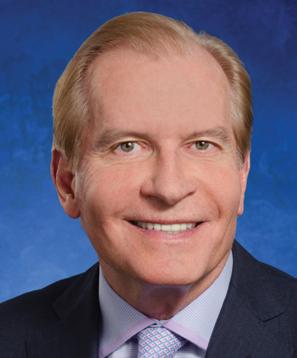
Senator Brandon Creighton was sworn in to the Texas State Senate on August 26, 2014, to represent the citizens of Senate District 4, which encompasses parts of Montgomery, Harris, Chambers, Jefferson, and Galveston Counties. Before election to the Texas Senate, Senator Creighton served as State Representative for District 16 where his peers elected him to Chairman of the Texas House Republican Caucus. He also served as Chairman of House Federalism Committees tasked with overseeing the state’s relationship with the federal government and ensuring that Texas’ constitutional rights are protected. Throughout his legislative career, his priorities have distinguished him as a lawmaker that has kept Texas at the forefront as an economic engine and job creation state. Senator Creighton is an eighth-generation Montgomery County resident, where he resides with his family. He is a graduate of the University of Texas and holds his Doctor of Jurisprudence from Oklahoma City University School of Law. Senator Creighton is Vice President and General Counsel of the Signorelli Company in The Woodlands and is the owner of Creighton Realty Partners, LLC in Conroe. In his spare time, he enjoys Texas history, sports, hunting, and fishing.
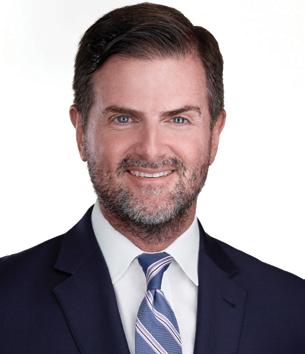
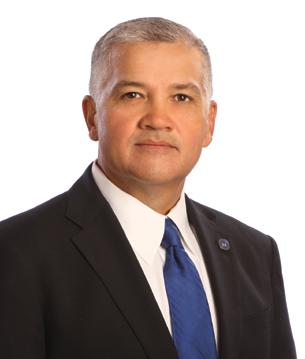
Dr. Mark Escamilla joined Del Mar College as president in October 2008, and since then the college has reached new milestones in instructional delivery, academic excellence, fiscal responsibility, administrative performance, and collaboration with other educational institutions, businesses, and industries. Dr. Escamilla considers raising the educational attainment level of the Coastal Bend region a priority. To that end, enrollment continues to increase, and the number of continuing and workforce credentials awarded has more than doubled in the past five years. The college has expanded its dual credit courses to 24 independent school districts across three counties. The college also works closely with new and established business and industry in the region, providing workforce training for thousands of Coastal Bend residents annually. Under Dr. Escamilla’s leadership, the college successfully completed 5 and 10 year accreditation reviews and has earned multiple national awards for financial accountability and budget transparency. He is a Del Mar College graduate with bachelor’s and master’s degrees from Texas A&M University-Corpus Christi. In addition to earning his Ph.D. in educational administration from The University of Texas at Austin, Dr. Escamilla was also selected as a “Distinguished Graduate of the Community College Leadership Program” from the University in 2009.
Dr. Steve Head was appointed as the fourth chancellor of Lone Star College (LSC) in 2014 after a 30 year history of high-level positions at LSC including President of Lone Star College-North Harris, Executive Vice Chancellor, acting Chief Executive Officer, interim President at Montgomery College and President of Kingwood College. His focus is on student access, equality, success, and completion; academic quality; workforce programs in alignment with community needs; and collaborative agreements with educational, business, and local civic organizations. Dr. Head received his Ph.D. in History from Texas Tech University. He earned a Master of Arts degree in History and a Bachelor of Arts degree in History from Lamar University in Beaumont Texas. In addition, he previously taught history undergraduate and graduate classes for LSC and university partners, and graduate classes in community college leadership and higher education finance. Dr. Head currently serves on the American Association of Community Colleges board of directors and has served on the board of five area chambers of commerce and three economic development districts or councils. He has served on the Executive Committee for the Texas Association of Community Colleges and on the Executive Committee for the American Association of Community Colleges.
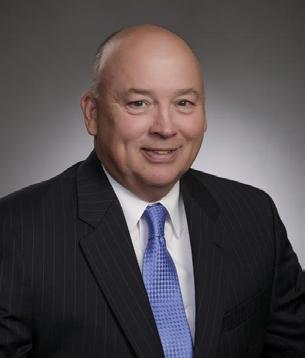
Dr. Brenda Hellyer was appointed in 2009 as the chancellor of San Jacinto College, Texas’ eighth largest community college with about 45,000 credit and non-credit students, five campuses, and several extension centers. The college opened the fifth campus at Generation Park in Fall 2020. Prior to joining San Jacinto College, Dr. Hellyer worked in the corporate world as an accountant in both the private and public arena. She holds a bachelor’s of science degree in accounting from Fort Hays State University in Hays, Kansas, a master’s degree in business administration from the University of Texas at Austin, and a doctorate degree in community college leadership from the University of Texas at Austin. Dr. Hellyer is involved with various commissions, committees, and boards at the national, state, and local levels. She is a wife, mom, and grandma. Her passions are her family and her community.
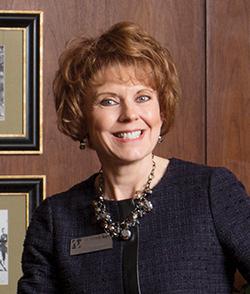

Brian Jones of Odessa is the Director of Professional Learning and an Adjunct Faculty at Odessa College. He is a member of the National Education Association and the Texas Association of College and University Student Personnel Administrators. Additionally, he is a former member of the National Association of Secondary School Principals and the Association of American Educators. He served as a public school teacher and administrator for more than 12 years. He is a community organizer for Vitalant Blood Services and the music director for Life Challenge Church. Jones received a BMEd and a MMEd from Texas Tech University; Educational Leadership and Administration with Principal Certification from Lamar University; and is completing his ED.D. in Organizational Leadership from Abilene Christian University.
Dr. Brenda Kays’ career as a community college educator, both in Texas and in the North Carolina System, spans over 30 years and includes the roles of faculty member, chief student services officer, chief instructional officer, and college president. Prior to being named the ninth president of Kilgore College (KC) in 2016, Dr. Kays served as the fourth President of Stanly Community College (SCC) in North Carolina and is the first woman to serve in both of those capacities. She earned her Doctorate from the University of North Texas in Applied Technology, Training, and Development. She has a Master’s Degree in Counseling from Midwestern State University and is a Licensed Professional Counselor. Dr. Kays holds and has held membership in numerous local, state, and national organizations, including most recently the Board of the Southern Association of Colleges and Schools Commission on Colleges Executive Council; Vice-President and Legislative Chair for the Texas Association of Community Colleges; National Center for Inquiry and Improvement: Rural Leader Learning Community; Arts!Longview Board of Directors, and Rotary International.

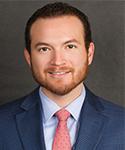
Representative Oscar Longoria is currently serving his fifth term as Representative for House District 35, which encompasses both Hidalgo and Cameron Counties in the Rio Grande Valley. Representative Longoria, a Mission native, attended South Texas College for one year before transferring to the University of Texas at Austin, where he graduated in 2003 with a Bachelor of Science in Communication Studies. In 2007 he earned his Doctor of Jurisprudence from the University of Texas School of Law. Prior to his time in the Legislature, Representative Longoria served as a Trustee for South Texas College, which provided him with insights and experience which will be vital to the work of the Texas Commission on Community College Finance. Professionally, he owns and operates the Law Office of Oscar Longoria. Representative Longoria is married to Jennifer Ruiz-Longoria of Mission, also a University of Texas at Austin Alumni. They have two beautiful daughters, Camilla Lee and Madison Lee.
Carol A. Scott, APR, Fellow PRSA is chairman of the Community College Association of Texas Trustees and Board Chair of the Del Mar College Board of Regents where she has served as a regent since 2014. Ms. Scott is a public affairs consultant from Corpus Christi serving a variety of business sectors including energy, manufacturing, refining, financial, retail, and government. She is a member of the Public Relations Society of America’s College of Fellows and received PRSA’s Paul M. Lund Public Service Award. Ms. Scott is a graduate of Texas A&M University –Kingsville. She is past president of the Javelina Alumni Association, serves on the President’s Leadership Council, and is a Distinguished Alumnus from the University. Previously she was elected to the Corpus Christi Independent School District Board of Trustees and served three terms as president of the board. She is a past president or chairman of the Texas Public Relations Association, Corpus Christi Chamber of Commerce, League of Women Voters, and the Arts Council among others. She is a graduate of Leadership Corpus Christi and Leadership Texas.
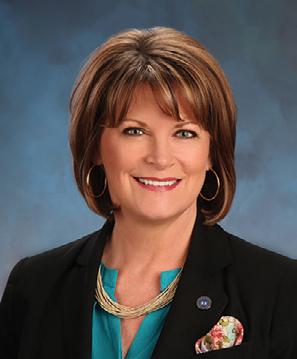
Senator Larry Taylor is a lifelong Texan and Baylor University graduate raised in Friendswood. He and his wife, Kerri, have three adult children and four grandchildren. Senator Taylor formerly owned Truman Taylor Insurance Agency in Friendswood, an independent agency started by his father more than 50 years ago. The agency merged with Galveston Insurance Associates in 2017. Before his election to the Texas Senate in 2012, he served five terms in the Texas House of Representatives. Currently, Senator Taylor serves as Chairman of the Senate Committee on Education and as a member of the Higher Education, Finance, Veterans Affairs and Border Security, and Water and Rural Affairs Committees. He is also a member of the Legislative Budget Board, a permanent joint committee responsible for developing budget and policy
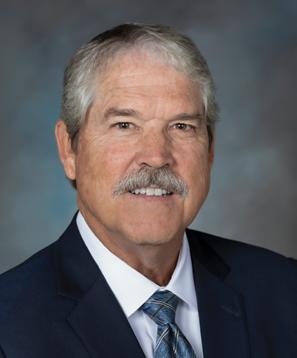
recommendations for legislative appropriations. During the 87th Legislative Session in 2021, Senator Taylor sponsored House Bill 4545, a comprehensive learning acceleration program, and House Bill 1525, a continuation of the comprehensive overhaul of the public school finance system that began in the 86th Session. He also served as Chair of the Senate Finance Article III working group, and was a member of the state budget Conference Committee, a select group of 10 legislators chosen to make budget decisions before the bill is voted on by the entire legislature.
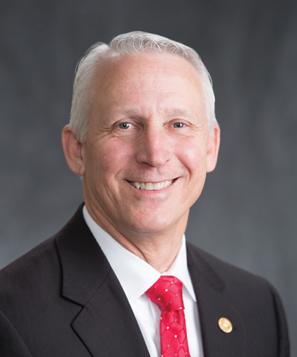
Representative Gary VanDeaver will be serving his fourth term as the state Representative for Texas House District 1, which includes Bowie, Lamar, Franklin and Red River counties, during the 87th Legislature. Dr. VanDeaver was reappointed by the Speaker to continue his service on the House Committee on Appropriations and the House Committee on Public Education, which he has served since his first term in 2015. Raised on a small family cattle operation near Clarksville, Texas, in Red River County, Dr. VanDeaver learned the importance of a strong work ethic, a love for the land, and faith in God from an early age. Inspired by a deep-seated belief in serving others and investing in our rising generation, he embarked on a 33-year career as an educator. After beginning his career as a vocational agriculture teacher, he became a school principal and completed a Doctorate in Educational Administration. He most recently served as Superintendent of New Boston Independent School District before his initial election to the Texas House in 2014. Dr. VanDeaver and his wife, Pamela, have been married for 38 years. Locally, he is involved with the Chamber of Commerce and Lions Club, having served as president of both. He also served on the Board of Directors of the Texas FFA, Red River County Farm Bureau, Bogata Rodeo Association, and Red River County Fair Association.
Mr. Todd Williams is the founding Chairman and CEO of The Commit Partnership, the nation’s largest educational collective impact organization. The Partnership and its backbone staff are collectively focused on meaningfully improving post-secondary completion and economic mobility levels across both the Dallas Ft. Worth region and Texas overall. Since 2019, Mr. Williams has been appointed annually by Governor Greg Abbott to serve on the School Land Board, responsible for overseeing the investment of its $12 billion fund supporting Texas’ K-12 public education system. In 2017, he served as a Governor Abbott appointee to the year-long Texas Commission on Public School Finance, which produced 35 recommendations that served as the basis for Texas’ landmark HB3 legislation which equitably invested $11.5 billion in the state’s public K-12 education system. Mr. Williams is also the former Chair of the Board of Trustees for Austin College in Sherman, Texas.

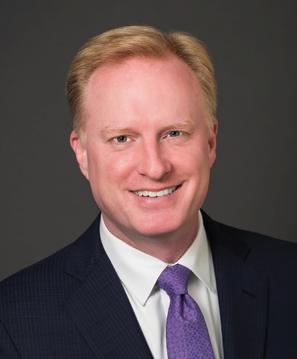
Dr. Harrison Keller is the Commissioner of Higher Education for the State of Texas. He is a sixth-generation Texan with more than two decades of experience in educational budget and policy, digital learning, senior university administration, management, fundraising, and building effective coalitions among school districts, community colleges, universities, systems, and policymakers. Dr. Keller is a recognized innovator in policy and programs to improve college readiness and student success, especially for low-income and first-generation students. His experience includes serving as Deputy to the President, Vice Provost, and as a faculty member at UT Austin, and as a senior legislative aide in the Texas Senate and Texas House of Representatives. Dr. Keller received his B.A. with honors from the University of Notre Dame and his master’s and doctoral degrees in philosophy from Georgetown University.
Amy Peterson
Assistant Commissioner for External Relations
Emily Cormier
Assistant Commissioner for Funding and Resource Planning
Marjorie Barrett
Assistant Commissioner for Communications
Melissa Humphries
Deputy Assistant Commissioner of Research and Analysis
Christopher Fernandez
Director, State Funding
David Drew
Program Director, Community and Technical Colleges
Christine
SalzmanPolicy Specialist